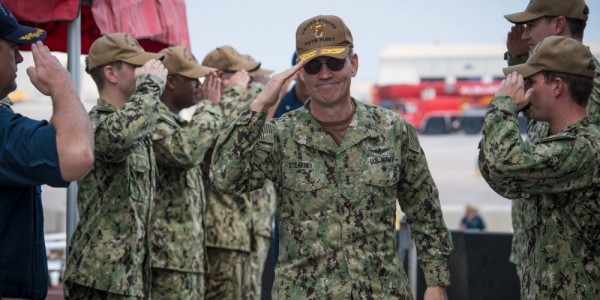

An investigation has determined the commander of 5th Fleet’s death six months ago was a suicide, a Navy official confirmed on Tuesday.
Vice Adm. Scott Stearney was found dead in his Bahrain home on Dec. 1. Chief of Naval Operations Adm. John Richardson said at the time that investigators did not suspect foul play.
A preliminary Naval Criminal Investigative Service inquiry later found that Stearney had killed himself, Navy Times reporter Geoff Ziezulewicz first reported on Monday.
Investigators found enough evidence to conclude Stearney intended to commit suicide, according to a redacted copy of the investigation, which was provided to Task & Purpose.
“The timeline of events and witness statements support this conclusion,” the investigation says.
Vice Adm. James Malloy arrived in Bahrain shortly after Stearney’s death and the Senate confirmed him as the new 5th Fleet commander on Dec. 6.
Malloy issued a statement on Tuesday calling Stearney a “superb officer” whom he and many others revered and respected.
“His leadership as the 5th Fleet Commander, and the initiatives that he put in motion enhanced our readiness, expanded partnerships across the region, and set a course for this command that remains our way ahead – we continue to reap the benefits of that leadership and vision,” Malloy said. “Along with the U.S. Naval Forces Central Command and Combined Maritime Forces team, I mourn the loss of an incredible Navy leader, and I miss the camaraderie and wise counsel of my friend.”
Last year the Navy saw the highest number of active-duty suicides since 2006. A total of 68 active-duty sailors took their own lives. Another 11 reserve sailors also killed themselves.
Richardson has ordered the Navy to create a program to address flag officers’ physical and psychological health needs, said Navy spokesman Lt. Sam Boyle.
The program, which is still being developed, would utilize medical services provided by Tricare, Boyle told Task & Purpose.
“Senior leaders can receive physical and psychological health care while balancing the demands of their compressed schedules and unique operational requirements,” he said.
UPDATE: This story was updated on June 12 with information from the preliminary inquiry.
[shortcode-Suicide-disclosure]